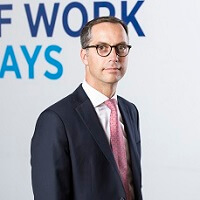Why and how to hire when times get tough
BLOG

WHY AND HOW TO HIRE WHEN TIMES GET TOUGH

The only constant in life is change – this has become even more apparent to all of us in recent times. Following months of momentous turbulence in the global political and economic sphere, many businesses are still feeling disorientated due to the unknown impact these changes will have on their market. What’s more, some are hesitant to make long-term commitments, particularly when it comes to their hiring decisions.
Remember, with big threats, big opportunities always emerge
I strongly believe that the most successful businesses are those which will adapt to change, no matter how unpredictable that change may be. Our CEO Alistair Cox sums this up in his recent LinkedIn blog and explains how “crises and uncertainty cause people to complicate things.
A leader’s job is to simplify them and set the action plan. Crises cause many people to hunker down and do nothing. Leaders will see opportunity in the inertia of others and take steps forward, steps that were previously maybe impossible.”
Take advantage of this hiring opportunity
Think about it – if you strategically and proactively hire during these unstable periods, you will ensure your business is uniquely positioned to capitalise once stability is reinstated. These unstable times could also bring opportunity to your business if you are open to taking advantage of it. As other organisations respond to the instability by making redundancies, this could be a rare opportunity for your business to build and future-proof your talent pool. Not only this but by avoiding the temptation to put a freeze on hiring, your retention rates will improve, as your workforce remain content and not over-worked. So, how can you staff your business as effectively as possible in these unstable times?
Know what you need
How best can you gauge exactly what you are looking for, and make this clear to both the recruiter and on the job description?
Start by reviewing your current and upcoming projects. Which skills are required to execute these? Think about what type of soft traits the right candidate should exhibit, such as problem-solving or being communicative. What type of person would integrate well with the team?
What about contract type? Do you need a permanent or temporary hire? There is a lot to be said for hiring temporary staff during periods of instability. Perhaps you have a number of assignments with tight deadlines. You’re not sure if these projects require a permanent hire, and whether you have the budget for this, you just know you can’t wait around much longer. If you are looking to get these projects completed in a speedy, cost-efficient way, hiring skilled temp workers is a great approach to take.
Create a tailored job description
Now you are clear on what you need in your new hire, channel this into a tailored job description which avoids attracting the wrong type of candidate. Having a tailored job description will ultimately separate the wheat from the chaff, saving you time and money during this critical period by only attracting relevant applications.
Instil rigour in your recruiting
During periods of instability, the impact of a bad hire, particularly at the top, can have even more damaging repercussions. Therefore, it is important that your recruitment process is as thorough as possible. Before you even tackle that pile of applications, have in mind how many candidates you want to interview, therefore how many CVs to shortlist. In the world of recruitment outsourcing, we are often set service level agreements around things like time to hire, and we constantly monitor things such as application to hire ratios, or interview to hire ratios to ensure we’re always working as efficiently as possible and maintaining quality.
Once you reach the interviewing stage, make sure your interview questions centre around the candidate’s skills, competencies, plus how well they would fit into the organisation. Ask every candidate the same questions so as to get an accurate and fair assessment of how they compare.
Ensure your assessment methods and tools are up to scratch to reduce the chance of a bad hire slipping through the net. These could include psychometric and technical tests. Atkins are a great example of an organisation who use sophisticated assessment methodology as part of its hiring process.
Sell yourself as an employer of choice
As I mentioned in my introduction, economic instability and fluctuations in the market will always determine how willing we are to take risks. This is true for job seekers as well as hiring managers, so it is important, now more so than ever before, that you position yourself as a risk worth taking. When liaising with the recruiter, writing the job advert and interviewing the candidate, be sure to highlight the best aspects of the company and role; from your reputation and credence within your industry to the progression opportunities and company culture.
Improve processes to reduce time to hire
Uncertain times demand agility. Look at your current time to hire, and work on reducing this. For instance, if the position is temporary or junior, don’t put the candidate through multiple rounds of interviews, involving several stakeholders. Use my previous advice surrounding how to make the interview process as time effective and rigorous as possible, and trust what your gut tells you afterwards. You don’t want to lose out on an in-demand candidate because you took too long to make your decision and put forward your offer.
In sum, hiring during periods of uncertainty requires more organisation, planning and caution than usual, but should by no means be avoided. Now is the time to build a strong workforce which can support you as you steer through the turbulence, ready to reap the rewards once it settles down.
I hope you enjoyed this article. You may also find the below blogs useful during the hiring process:
- How prepared are you for your new starter? Five tips for an effective induction
- Is it possible to unite a remote workforce?
- How to recruit a purple squirrel (and other hard-to-find creatures)
- Three pieces of advice every interviewer should follow
- How to ensure your candidate enjoys their interview
- Six of the best risks you can take when hiring new talent
AUTHOR

Matthew Dickason
Global Managing Director, Hays Talent Solutions
Matthew is the Global Managing Director for Hays Talent Solutions, having joined Hays in 2005. Previous roles held at Hays include Business Director in the UK and Chief Operating Officer for Asia Pacific. He is now responsible for leading the global business of Hays Talent Solutions and investing to ensure clients retain a competitive advantage in talent acquisition from the delivery of Hays MSP, RPO, technology and modular service solutions. For more information about Hays Talent Solutions, visit our website.
Prior to joining Hays, Matthew worked within Engineering, Research, Operations and Commercial areas at Johnson Matthey and Corning Inc. He has formal qualifications in Organisational Psychology and Industrial Engineering.
